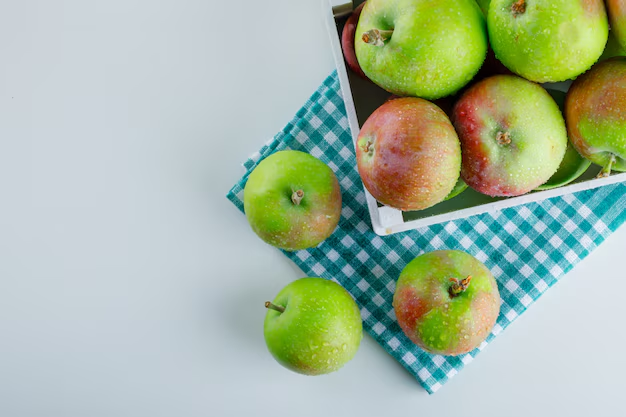The Ultimate Guide to Storing Apples: Should You Keep Them in the Refrigerator?
Have you ever wondered why that shiny red apple ends up soft and mealy just a few days after you get home from the grocery store? It's all about storage, and refrigeration might just be the key to keeping apples fresh longer. In this comprehensive guide, we'll dive into whether refrigeration is the right choice for your apple stash. Plus, we’ll explore how to get the most out of your apples and prolong their freshness.
🍏 Why Apple Storage Matters
Apples aren't just any fruit. They're a staple in households worldwide, prized for their crisp texture and juicy flavor. Proper storage can significantly impact their quality, taste, and shelf life. Knowing where and how to store apples can help prevent premature spoilage, providing you with delicious, fresh fruit for longer.
🥶 The Case for Refrigeration
The Science Behind Apple Ripening
The ripening process of apples is a countdown initiated by ethylene, a natural hormone that promotes ripening in many fruits. When kept at room temperature, apples will continue to ripen rapidly. Refrigeration, however, slows down the production of ethylene, thus delaying the ripening process and extending the fruit's life.
Benefits of Refrigerating Apples
- Extended Shelf Life: Refrigeration can keep apples fresh for several weeks longer than storing them at room temperature.
- Maintained Crispness: The cold environment preserves the apple's texture, keeping it crisp and enjoyable to eat.
- Flavor Preservation: Slowing the ripening process helps maintain the apple's fresh taste.
Storage Tips for Refrigerating Apples
To make the most of your refrigerated apples:
- Temperature Matters: Keep your refrigerator at or below 40°F (4°C) to effectively slow ripening.
- Separate from Other Produce: Apples emit ethylene gas, which can cause other fruits and vegetables to spoil faster. Store them in a separate drawer or bin.
- Use Plastic Bags with Holes: These allow for ventilation while retaining moisture, preventing the apples from shriveling.
🌡️ When Room Temperature Makes Sense
While refrigeration is beneficial, there are times when storing apples at room temperature is preferable.
Short-Term Storage
If you'll be consuming the apples within a week, room temperature is perfectly adequate and convenient. The apples will remain fresh and ready to eat without the chill of the refrigerator.
Display and Ripening
Apples are often displayed in fruit bowls on kitchen counters for easy access and natural room decor. This method also allows them to ripen to perfection if they're slightly under-ripe when purchased.
👨🍳 Culinary Considerations: How Storage Affects Cooking
Storage affects not just the freshness of apples but also their suitability for various culinary uses. Here’s how:
Baking and Cooking
Some recipes benefit from apples that are slightly softer or fully ripe, as they provide more juice and enhanced sweetness, making them perfect for sauces, pies, and other baked goods. If you're planning to transform your apples into a delicious dessert, keeping them at room temperature until they're fully ripe might be beneficial.
Fresh Eating
If you prefer apples for snacking, salads, or dishes requiring a crunchy texture, refrigerating them will ensure they remain crisp.
🍎 Apple Varieties and Their Storage Preferences
Not all apple varieties respond the same way to storage. Understanding the differences can help you choose the best method:
- Long-Storing Varieties: Some apples like Granny Smith and Fuji are known for their storability and are ideal for refrigeration.
- Delicate Varieties: Apples such as Gala or Honeycrisp may not store as long but can still benefit from refrigeration to maintain freshness.
Summary of Apple Storage Preferences
| Apple Variety | Recommended Storage | Notes |
|---|---|---|
| Granny Smith | Refrigeration | Long shelf life, maintains crispness well |
| Fuji | Refrigeration | Excellent for long-term storage |
| Gala | Refrigeration or Room Temp | Softer texture, shorter storage time at room temp |
| Honeycrisp | Refrigeration | Maintains flavor and crispness |
📝 Practical Tips for Storing Apples
Quick Takeaways
- Refrigerate for Longevity: Apples last significantly longer when refrigerated.
- Separate and Ventilate: Use bags with holes and store separately from other produce.
- Short-Term Room Storage: Fine for immediate use and ripening.
Key Storage Tips
- Check Regularly: Regularly check apples for any signs of spoilage and remove damaged ones to prevent spreading.
- Avoid Moisture: Too much moisture can lead to rot, so ensure apples are dry before storage.
- Use the Crisper Drawer: This part of the refrigerator is specifically designed to maintain the right humidity levels for produce.
🍽️ Making the Most of Your Apples
Ultimately, whether you store apples in the refrigerator or at room temperature can depend on your needs and plans. However, with these tips and tricks at your disposal, you can extend the life and enjoy the full flavor of your apples. From bakes to fresh snacks, keeping apples at their peak condition ensures you’re always ready to whip up something delicious.
The next time you bring a bunch of apples home, consider their purpose and choose a storage method that aligns with it. Whether they sit proudly in a decorative fruit bowl or chill in the crisper drawer, your apples can be as enjoyable at the end of their shelf life as they were at the start. Happy storing, and even happier snacking! 🍏

